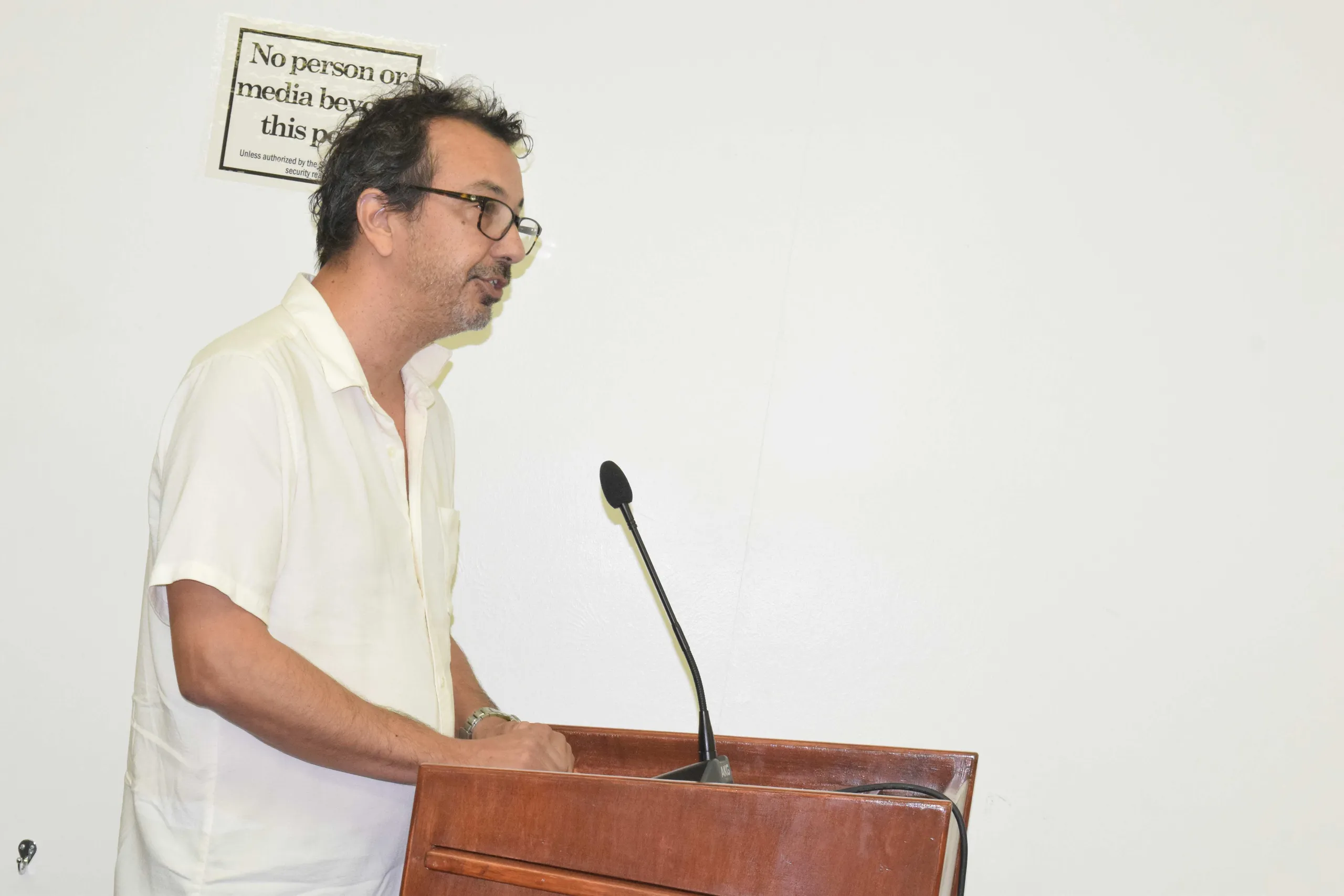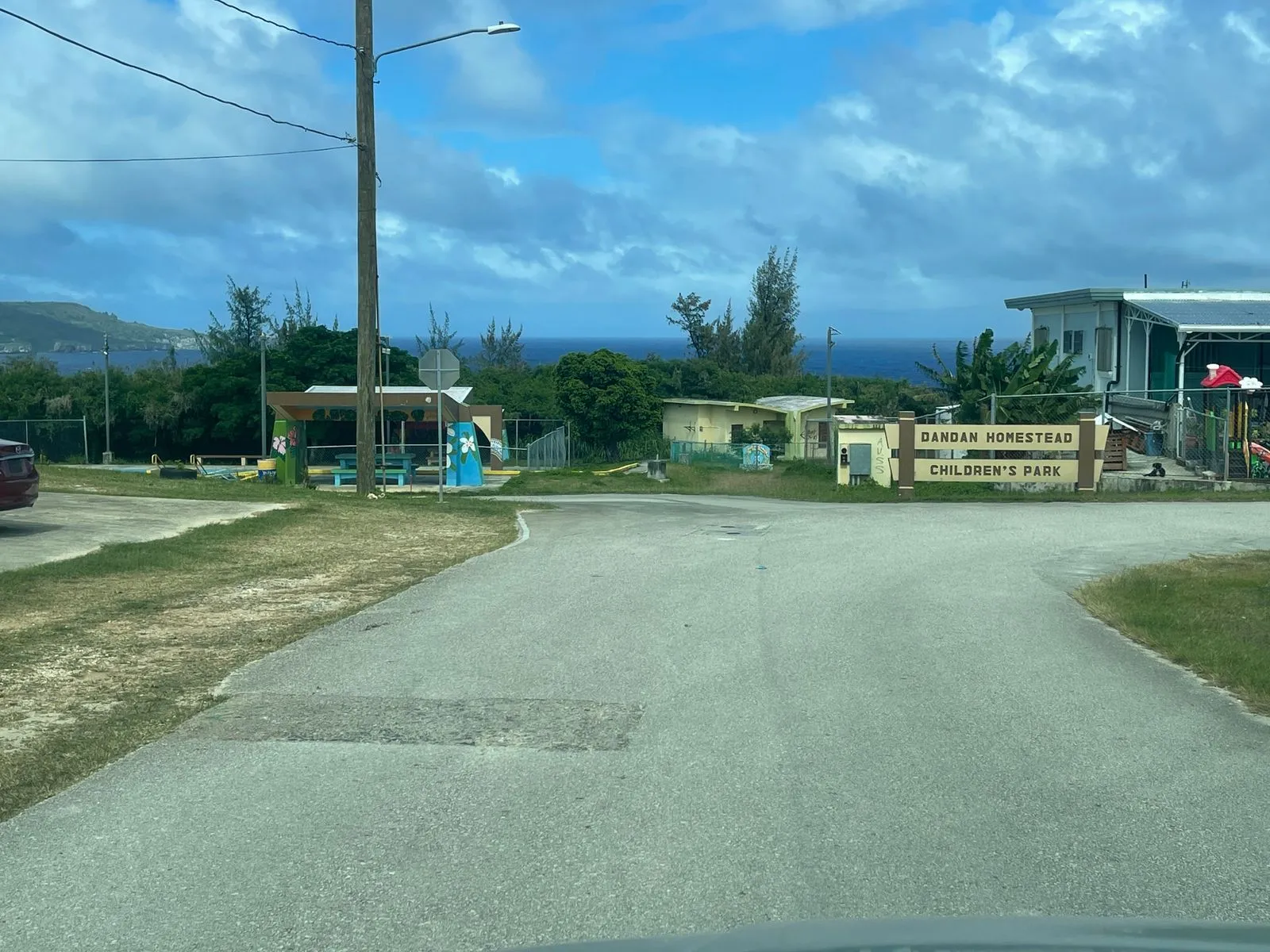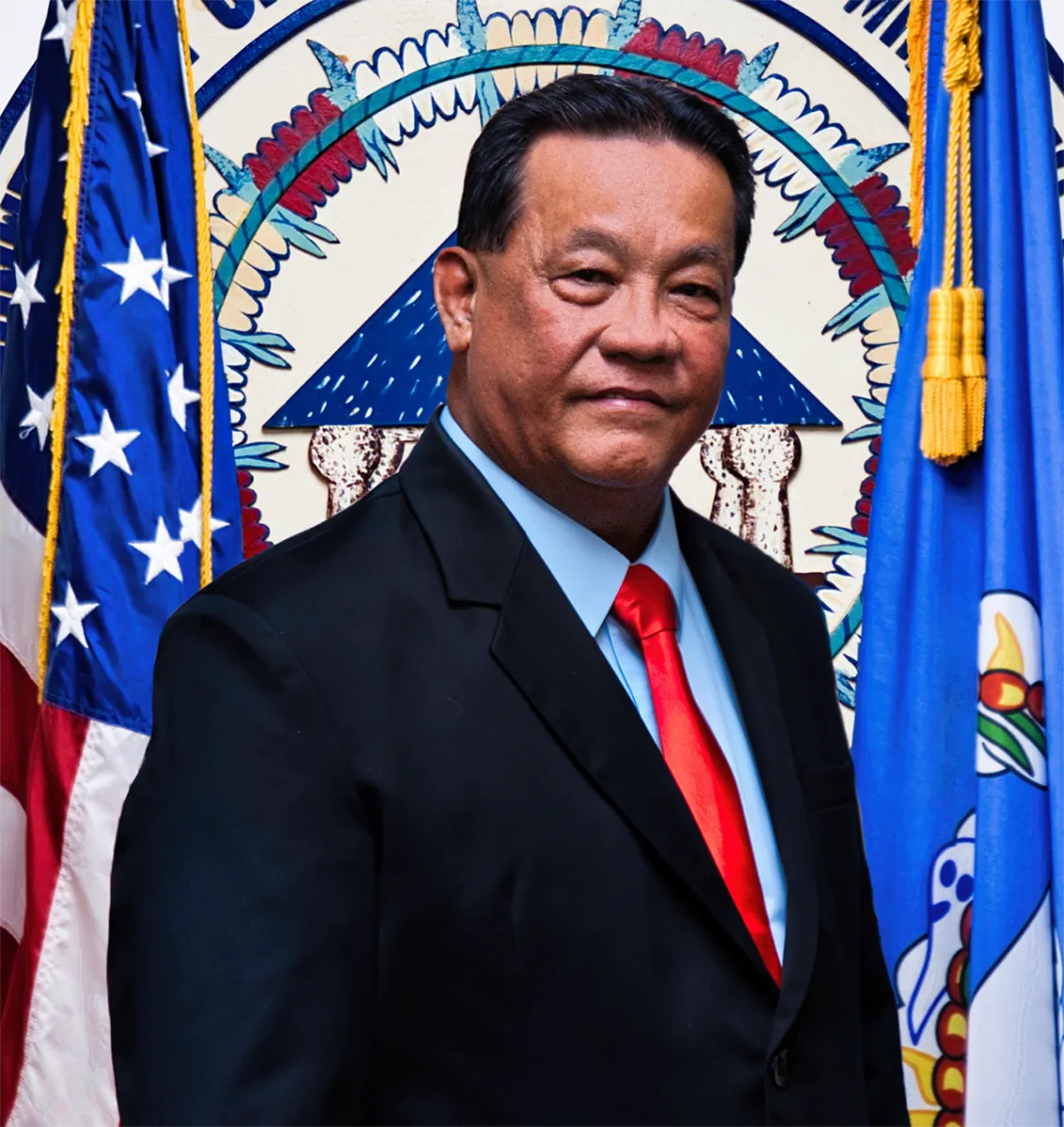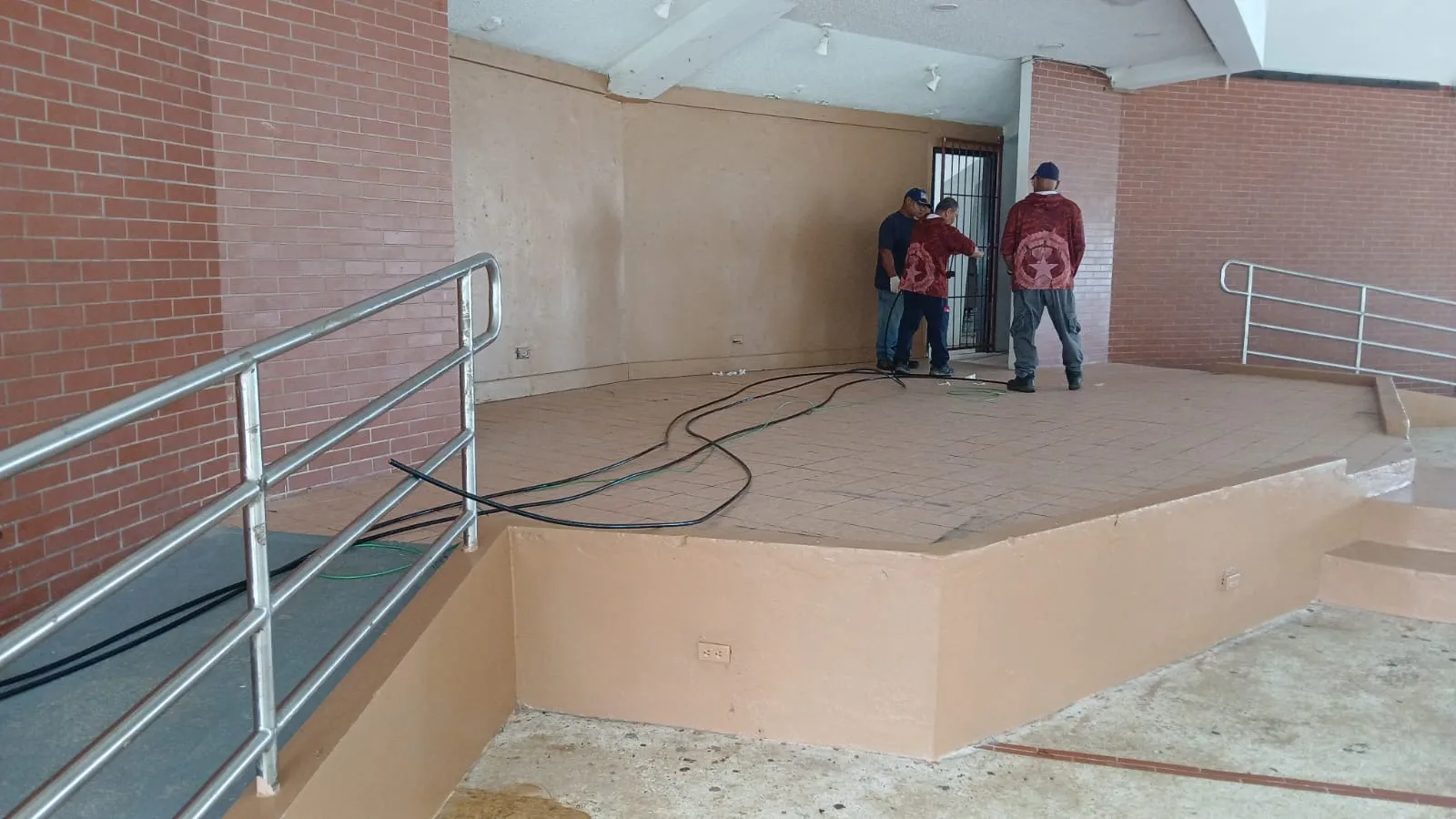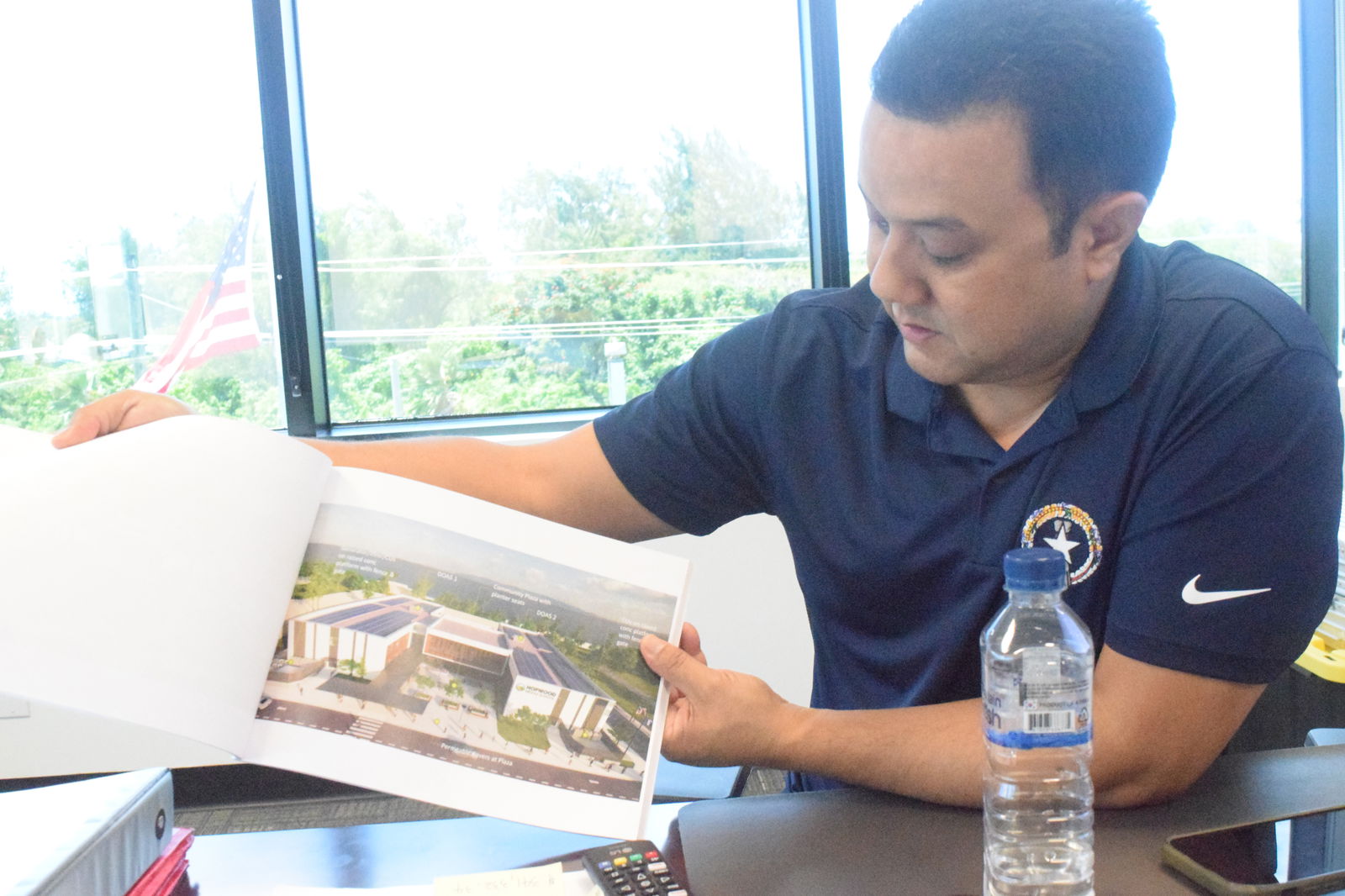
Public Assistance Officer Patrick Guerrero shows an architectural and engineering design of one of the disaster recovery projects funded by the Federal Emergency Management Agency during an interview on Thursday.
Photo by Emmanuel T. Erediano
THE Federal Emergency Management Agency gave the CNMI government six months to complete 141 disaster recovery projects funded by the U.S. government to help the Commonwealth rebuild from the devastation caused by Super Typhoon Yutu in Oct. 2018.
In his letter to Gov. Arnold I. Palacios on April 30, 2025, FEMA Region 9 Administrator Robert Fenton said it has come to his attention that the CNMI has approximately 141 projects categorized as “permanent work” with incomplete work or awaiting approval of requests for extension.
Coded as Categories C, D, E, F, G, the permanent work projects involve the reconstruction of vital infrastructure, such as school buildings that were heavily damaged by Yutu. Category A projects are for debris removal, while Category B projects pertain to emergency protective measures, which have long been completed in the years following the super typhoon.
Fenton, in his letter, said urgent action is required, citing FEMA regulations, which state that the period of availability of funds for all disaster declarations is limited to eight years from the date of declaration, which was Oct. 26, 2018. The eight-year period ends on Oct. 26, 2026.
The FEMA administrator is directing CNMI government agencies with permanent construction projects to complete the work within six months of receipt of his letter on April 30, 2025. Fenton said that any projects that fail to demonstrate work toward completion within the six-month period will be closed, and the funds for these projects will be de-obligated by FEMA.
Fenton said FEMA has obligated over $280 million for the projects associated with disaster recovery from Super Typhoon Yutu. Of this amount, only $154 million has been disbursed, which means, $127 million of disaster recovery funding remains unused.
To comply with statutory deadlines and ensure the efficient use of federal funds, Fenton said he has directed his Region 9 team to close all the debris removal and emergency protective projects within the next 30 days.
Regarding the FEMA funds for management or administrative costs categorized as “Z,” the CNMI government will have two weeks, upon completion of these types of projects, to reconcile and close them.
Fenton also instructed his team to expedite “closeout” for 44 emergency work projects, specifically the debris removal and emergency protective measures that remain open.
Because it has been more than six years since debris removal and emergency work projects were initiated, it is essential that they be closed without further delay, Fenton said.
He also noted that 27 management cost projects have been obligated and require closure.
Almost done
In an interview on Thursday, CNMI Public Assistance Officer Patrick Guerrero said that of the 141 permanent construction projects that Fenton mentioned in his letter, 51 “are ready to close out, meaning, the work is done, completed, or in the process of closing out.”
As for the 90 other permanent construction projects, he said the CNMI has “received an extension” of six months to complete them.
Based on his interpretation of Fenton’s letter and a recent conversation with FEMA officials, Guerrero said the CNMI government only needs to “demonstrate that we are working towards…completion.”
He added, “We are making additional requests with our justification, showing them…that we are working towards the completion of these projects.”
Guerrero shared with Variety a list of these permanent construction projects, most of which involve school buildings destroyed by Yutu.
He said these projects will require more time, “but we are confident we are able to demonstrate, when that time comes, that these projects are ongoing, either the design has been completed, or are actually into construction phase.”
He said the FEMA funds for permanent construction projects were not utilized right away by the CNMI government because some agencies that received the funds — the Commonwealth Ports Authority, for example — spent their insurance monies instead.
Other government agencies, such as the Public School System and the Department of Public Works, were able to secure funds from other federal sources.
Guerrero said that “FEMA was the last resort” of funding for Yutu reconstruction projects.
As for the debris removal and emergency work projects that the CNMI was given 30 days to “close out,” they were completed two years after the disaster declaration in 2018, Guerrero said.
Regarding FEMA-funded management or administrative costs, Guerrero said some of them did not reflect the actual cost of managing or administering Yutu-related projects.
The federal funds were more than sufficient, so some management costs have not yet been closed out and are “still sitting in the books,” Guerrero said.
The CNMI government was awarded $28.7 million for management costs. Of that, the PAO alone received $15 million solely for office operations over an eight-year period ending Oct. 26, 2026. “And what have we used so far? We have used only $10 million,” Guerrero said.
He said that in the last seven years, the PAO has been awarded $15.2 million. “We are not going to spend it [the whole amount] just because we can, but it is there for us to use. We didn’t really need that much money to do the work because…that management-cost funding was [mostly] for…[public] announcements.”
When asked whether FEMA gave the CNMI too much money, Guerrero responded, “Yeah.”
In a separate interview, Lt. Gov. David M. Apatang said, “I don’t believe in returning any federal money….”
He said that whatever amount of funds the Commonwealth received from the federal government, “we should maximize it — use it to the max.”
As for the 141 permanent construction projects that have yet to be closed, Apatang said, “We should be pushing for the projects — expedite those projects.”
He said there are projects that “are already on the way; some are ready for bids, and some have already started construction. We just have to keep on pushing those.”



